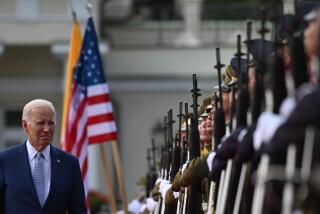Albright Nudges Russia on NATO Pact
- Share via
MOSCOW — U.S. Secretary of State Madeleine Albright talked for 2 1/2 hours with Russian leaders here Thursday but came away with few signs of progress in the tortuous process of coaxing Moscow into a formal relationship with the North Atlantic Treaty Organization.
After two meetings with Russian Foreign Minister Yevgeny M. Primakov and a 20-minute telephone conversation with President Boris N. Yeltsin, who was vacationing outside Moscow, Albright told reporters that “we may have somewhat narrowed the differences,” but then acknowledged that “we still have some ways to go.”
Senior administration officials traveling with Albright made it clear that the pace of negotiations will have to accelerate if a charter formalizing relations between Russia and the NATO alliance is to be signed by Yeltsin, President Clinton and other alliance leaders as hoped later this month in Paris.
Establishing a formal relationship between Russia and NATO is considered vital to prevent Moscow from being squeezed out of a rapidly evolving new security order for Europe, one that will offer many of Russia’s former allies--but not Russia itself--membership in an expanded organization.
Enlarging the alliance deep into Central Europe stands as the premier foreign policy initiative of the Clinton presidency. While it marks the fulfillment of long-nurtured dreams for countries such as Poland, Hungary and the Czech Republic, trapped behind the Iron Curtain for nearly half a century, enlargement is viewed as an aggressive act in Moscow.
For many, a successfully negotiated charter is essential to keeping Moscow engaged despite its strenuous opposition to alliance enlargement.
So far, four of the charter’s five sections are reportedly agreed upon, including one establishing a permanent NATO-Russia council at alliance headquarters in Brussels that will give Moscow a voice--albeit not a veto--on a range of regional security matters.
However, a fifth section, dealing purely with the military aspects of NATO’s enlargement, has become a serious sticking point, with Russia insisting on conditions, including permanent guarantees that no nuclear or additional conventional forces will be moved into new member countries. One of these countries, Poland, borders the Russian enclave of Kaliningrad.
NATO has issued unilateral statements declaring that it has “no intent, no plan, and no reason” to deploy nuclear weapons in new member states and also that it would not station substantial new combat forces under existing circumstances. But it has refused to be tied to anything more binding.
Thursday’s talks made only limited progress in bridging these differences.
“We mainly dealt with formulation of problems that need to be resolved, and our experts are working on specific solutions to those problems,” Primakov said.
The negotiations are complicated by the large number of countries involved, either indirectly or directly. Efforts to ease Russia’s worries over NATO enlargement by accepting lower military force limits in individual countries involves all 30 nations that are party to the 1990 Conventional Forces in Europe Treaty.
Although several Western leaders, including Albright, have nudged Moscow individually, it is NATO, with its 16 constituent nations, that is officially negotiating the charter.
Primakov is due to meet NATO Secretary-General Javier Solana next week for the next formal negotiating session.
Despite the lack of headway Thursday, there were hints that there could be enough political will in Moscow to agree with the West in time to sign the charter as planned.
Albright said that during her telephone conversation with Yeltsin, the Russian leader encouraged both sides “to move in our negotiations.”
Also, in talking to reporters, Primakov indicated that Moscow remained interested in finishing negotiations on the charter.
“We are realistic politicians. We believe that we need to have a relationship with NATO which would make us more secure in this new situation in the world,” he said.
More to Read
Get the L.A. Times Politics newsletter
Deeply reported insights into legislation, politics and policy from Sacramento, Washington and beyond. In your inbox twice per week.
You may occasionally receive promotional content from the Los Angeles Times.










